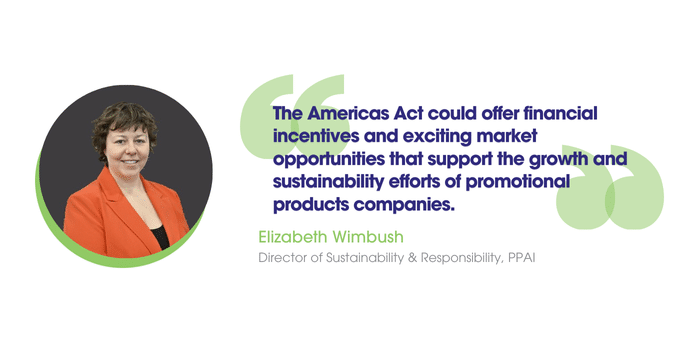Legislators have introduced the Americas Act, which as part of its larger goal to curb an overreliance on Chinese trade, proposes policies that, in theory, would create a domestic textile manufacturing circular economy through $14 billion of tax incentives.
- A circular economy is a system in which new materials are never introduced until a product reaches its absolute end-of-use lifecycle through processes of recycling, resale and repairs.
- PPAI Magazine recently covered the unique ways that promo companies are committing to a circular economy, particularly in apparel.
“Overall, if passed the Americas Act could offer financial incentives and exciting market opportunities that support the growth and sustainability efforts of promotional products companies involved in textile in textile goods,” says Elizabeth Wimbush, PPAI’s director of sustainability and responsibility.

Context, Details And Future
The Americas Act is unique in that it represents a bipartisan effort – introduced by Republican Senator Bill Cassidy and Democratic Senator Michael Bennet. It aims to create expanded trade opportunities between the United States, Latin America and the Caribbean.
A byproduct of its mission to discourage China’s trade dominance in the textile market, the bill proposes $14 billion worth of incentives toward creating a domestic circular textile market that would, in theory, contribute to a more stable U.S. economy and benefit the environment and its resources.
- The bill would accomplish this through a 15% tax reduction for U.S.-based businesses that participate in the collection, reuse, repair, recycling or renting of textiles.
The majority of this ($10 billion) would go toward preferential loans for the recycling and reuse of textiles. An additional $3 billion would be allocated to grants for programs that support these practices. Innovative research and development into textile recycling would receive $1 billion. Finally, $100 million would go toward public education programs around textile recycling.
- The bill also asks for increased tariffs on products imported to the U.S., encouraging manufacturers to centralize their supply chains domestically.
Any bill introduced during an election year faces political challenges, and the Americas Act still needs to pass the Senate, the House and go to the President before it can become law.
Promo Perspective
Textiles make up a significant portion of the materials used in many promotional products, making Americas Act of note to the industry.
In the broadest strokes, the promo industry has already been grappling with the risks involved in depending on Chinese exports, leading many companies to strategize a retreat from the country.
“Financial incentives to reshore supply chains would mean significantly lower transportation costs and shipping disruptions,” says Wimbush.
According to Wimbush, the proposed breakdown of the $14 billion represents multiple opportunities for promo companies in the textile market to find efficiencies while improving their sustainability initiatives.
“The $10 billion in preferential loans can help companies invest in sustainable textile practices,” Wimbush says. “The $3 billion in grants for manufacturing support programs can help them invest in new technology and equipment to improve efficiency, reduce waste and better utilize recycled materials.
“Then there’s the $1 billion for innovation and research, which can drive advancements in material and manufacturing techniques and help promotional products companies stay competitive with unique and high-quality goods that rely on repaired, reused or recycled materials.”


